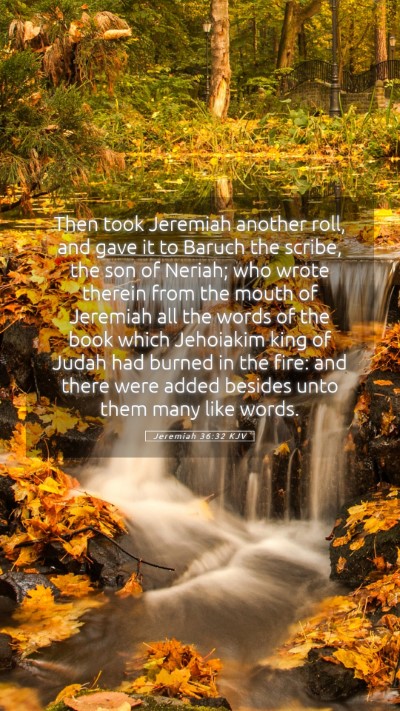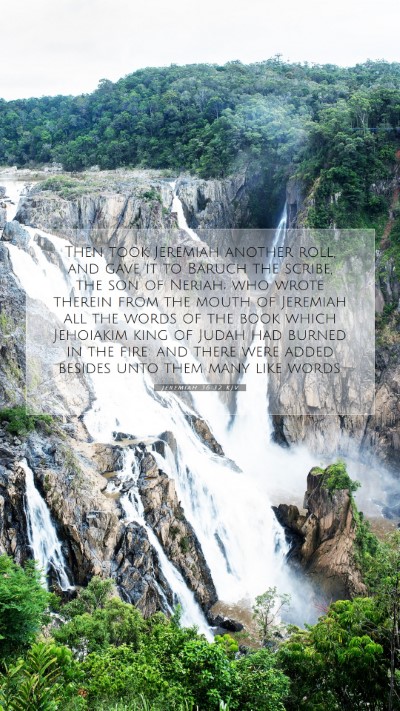Understanding Jeremiah 36:32
Jeremiah 36:32 reads:
"Then took Jeremiah another roll, and gave it to Baruch the scribe, the son of Neriah; who wrote therein from the mouth of Jeremiah all the words of the book which Jehoiakim king of Judah had burned in the fire: and there were added besides unto them many like words." (KJV)
Bible Verse Meaning
This verse is pivotal in understanding the resilience of God’s message through His prophet Jeremiah. It underscores the power of divine revelation and the fidelity of God's word despite opposition. Here’s a deeper exploration based on commentaries:
Commentary Insights
- Matthew Henry: This commentary highlights the unwavering nature of God's word. Henry expresses that the act of rewriting the scroll symbolizes that although King Jehoiakim burned the initial document, it did not extinguish the message. God’s purpose will prevail regardless of attempts to suppress it.
- Albert Barnes: Barnes notes the critical aspect of Baruch the scribe's obedience in transcribing God's words again. He emphasizes the faithful stewardship exhibited by Baruch, suggesting that this act is a testament both to God's sovereignty and the commitment of His servants.
- Adam Clarke: Clarke provides historical context to the verse, elaborating on how the burning of the scroll was a symbol of rebellion against God's authority. He asserts that this act could not hinder God’s message, which was renewed in the form of the new scroll dictated by Jeremiah. Clarke's interpretation stresses the persistence and power of the prophetic word.
Biblical Exegesis
The exegesis of this passage suggests multiple layers of meaning. This act of rewriting not only symbolizes renewal but also serves as a prophetic declaration. The addition of many similar words indicates that God’s message is consistent and vital:
- Renewal of God’s Message: No matter the attempts to destroy it, God's word remains eternal.
- Faithfulness of Servants: Baruch’s actions illustrate the dedication of those who serve God and strive to deliver His messages faithfully.
- God’s Sovereignty: This situation reflects God's power to ensure His will is accomplished despite human opposition.
Application of the Verse
Applying Jeremiah 36:32 to daily life can urge believers to remain steadfast in their commitment to God’s word, regardless of external pressures to diminish or distort it. The following applications are notable:
- Standing Firm: Just as Jeremiah and Baruch did not falter under the king’s decree, Christians should stand firm in their faith and witness.
- Preserving God’s Word: The act of sharing and teaching Scripture can be seen as a modern-day commitment to preserving and valuing God’s word.
- Encouragement among Believers: Like the faithful remnant that continues to transmit God’s message, believers are encouraged to support one another in studying Scripture through groups or initiatives.
Related Bible Cross References
- Jeremiah 1:9: "Then the LORD put forth his hand, and touched my mouth. And the LORD said unto me, Behold, I have put my words in thy mouth."
- Revelation 22:19: "And if any man shall take away from the words of the book of this prophecy, God shall take away his part out of the book of life..."
- 2 Timothy 3:16-17: "All scripture is given by inspiration of God, and is profitable for doctrine, for reproof, for correction, for instruction in righteousness..."
Conclusion
In summary, Jeremiah 36:32 serves as a robust reminder of the enduring nature of God's word. The commentaries shed light on its implications, encouraging believers to understand Scripture deeply and engage with it responsibly. In Bible study groups or individual reflection, this passage can inspire discussions on the importance of fidelity to God's messages in an ever-changing world.


